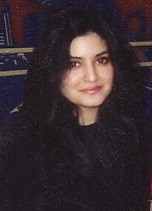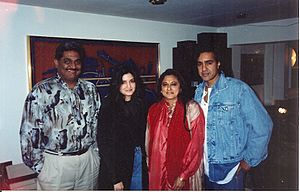Nazia Hassan facts for kids
Quick facts for kids
Nazia Hassan
|
|
|---|---|
| نازیہ حسن | |

Nazia in 1994
|
|
| Born | 3 April 1965 |
| Died | 13 August 2000 (aged 35) |
| Resting place | Hendon Cemetery and Crematorium, London |
| Occupation |
|
| Years active | 1980–1992 |
| Spouse(s) |
Ishtiaq Baig
(m. 1995; div. 2000) |
| Children | Arez Hassan (son) |
| Relatives |
|
| Musical career | |
| Genres | |
| Instruments | Vocals |
Nazia Hassan (born 3 April 1965 – died 13 August 2000) was a famous Pakistani singer, songwriter, lawyer, and social activist. Many people called her the "Queen of South Asian Pop." She is seen as one of the most important singers in the region.
Starting in the 1980s, she and her brother Zoheb Hassan formed the duo Nazia and Zoheb. Together, they sold over 65 million records around the world.
Nazia first sang the song "Aap Jaisa Koi" for the Indian film Qurbani in 1980. People loved the song, and she won the Filmfare Award for Best Female Playback Singer in 1981. She was only 15 years old, making her the youngest person and the first Pakistani to win this award.
Her first album, Disco Deewane, came out in 1981. It became a hit in fourteen countries and was the best-selling Asian pop record at that time. The album also had an English song called "Dreamer Deewane." This made her the first Pakistani singer to appear on the British charts.
Nazia released more albums like Boom Boom (1982), Young Tarang (1984), and Hotline (1987). Her song "Dum Dum Dede" from Young Tarang was used in the 2012 Indian film Miss Lovely. Her last album, Camera Camera (1992), was part of a campaign against drugs.
Nazia and her brother also appeared on TV. In 1988, they were on Sung Sung with music expert Sohail Rana. They also hosted Music '89, the first pop music stage show on TV. Her success greatly helped shape Pakistani pop music.
During her 15-year singing career, Nazia became one of Pakistan's most loved celebrities. She received Pakistan's special award, Pride of Performance. Besides singing, she also did a lot of charity work. In 1991, UNICEF made her their cultural ambassador. Nazia Hassan passed away from lung cancer in London on 13 August 2000, at the age of 35.
Contents
Early life and education
Nazia Hassan was born in Karachi, Sindh, Pakistan. She grew up in both Karachi and London. Her father, Basir Hassan, was a businessman, and her mother, Muniza Basir, was a social worker. She had two siblings, Zoheb Hassan and Zara Hassan.
Nazia studied Business Administration and Economics at the Richmond American University in London. She also earned a Law degree (LLB) from London University.
Music career
Nazia Hassan started her professional music career when she was fifteen. She met film director Feroz Khan at a party in the United Kingdom. He asked her to try out for his film Qurbani with Biddu, a music composer from London.
Biddu then chose her to sing "Aap Jaisa Koi" for the film. The song became a huge hit in India, and Nazia quickly became very famous. In 1981, she won the Filmfare Award for Best Female Playback. She was the youngest person at 15 and the first Pakistani to win this award.

Nazia worked with Biddu on many projects. In 1981, she became the first playback singer to release her own album, Disco Deewane. This album broke sales records in Pakistan and India. It also topped the music charts in the West Indies, Latin America, and Russia, becoming a worldwide success.
The album was a mega-hit, and Nazia became a well-known pop singer in Pakistan. Her brother Zohaib Hassan also sang on the album. Nazia and Zoheb were signed by EMI Group, becoming the first South Asian singers to sign with an international music company. When Disco Deewane was very popular, huge crowds, sometimes 50,000 to 100,000 people, would greet her at places like Calcutta Airport.
After Disco Deewane, Biddu offered Nazia and Zoheb a chance to act in the movie Star in 1982. But they chose to sing for the movie's soundtrack instead. The soundtrack album, Star/Boom Boom, was released and was very successful. Nazia was nominated for the Filmfare Award for Best Female Playback Singer again.
Nazia's third album, Young Tarang, came out in 1984. It was the first album in Pakistan to have music videos, which were made in London. The album became very popular across Asia. "Ankhien Milane Wale" was a famous song from this album.
After Young Tarang, she sang for Bollywood movies again. Her fourth album, Hotline, was released in 1987. "Aa Haan" was the most popular song from this album. In 1988, she and her brother Zohaib appeared on the TV show Sung Sung with music expert Sohail Rana.
In 1989, Nazia and Zohaib hosted the show Music '89. This show was the first all-pop music stage show to be shown on television. It helped many new bands and singers start their careers and became very popular in Pakistan. She also hosted another show called Dhanak on PTV that same year.
In 1991, Nazia and her brother Zohaib recorded their fifth album, Camera Camera. Before the album was released, they announced it would be their last. The album came out in 1992. After its release, Nazia stopped her singing career to focus on her personal life.
Personal life
Nazia Hassan married businessman Mirza Ishtiaq Baig on March 30, 1995. They had a son named Arez Hassan, who was born on 7 April 1997.
Charity work
Nazia Hassan used her fame to help others. She especially worked for children, young people, and women who were struggling in poor areas of Karachi. She supported the Inner Wheel Club of India and helped them raise money.
In Pakistan, she was an active member of groups like Voice of Women and National Youth Organisation (Pakistan). She helped bring mobile clinics to Lyari Town, making medicine easier to get for those who needed it.
Nazia worked with Javed Jabbar, a former Information minister, to raise money for children in Tharparkar and Rajasthan. She visited many schools to give toys to poor children and talked about helping those who are less fortunate.
In 1991, she joined the United Nations Security Council at the United Nations Headquarters in New York City and worked there for two years. In her third year, she worked for UNICEF. She was offered a scholarship for a leadership program at Columbia University because of her excellent social and academic work. However, she could not accept it because she was diagnosed with cancer around that time.
In 2003, Nazia’s parents created the Nazia Hassan Foundation. This foundation continues her efforts to make the world a better place for everyone. They decided to open a school for street children to help them get an education.
Death
Nazia Hassan passed away from lung cancer in London on 13 August 2000. She was 35 years old. She had been admitted to the North London Hospice three days before her death because her health got worse.
The day before she died, she seemed to be getting a little better, and doctors thought she might go home. However, the next day, her mother was called to the hospital. Nazia started coughing heavily and died within minutes from a pulmonary embolism. After a special prayer, Nazia was buried at Hendon Cemetery, London, on 5th September 2000, following Islamic traditions.
Impact and achievements
Influence and legacy
Pakistan's lively pop music scene today owes a lot to Nazia Hassan. Because of her contributions, she is known as the "Queen of Pop" in South Asia. She is also called the "Sweetheart of Pakistan." People often compare her to Princess Diana because she had a "heart of gold."
India Today magazine named her one of the top 50 influential people. The magazine noted that she started the trend of personal music albums in India, inspiring artists like Alisha Chinai and Lucky Ali.
On 9 March 2002, a Nazia Hassan Tribute Concert was held in Karachi. Famous bands like Vital Signs and Jupiters performed together for the first time in almost seven years. In 2007, Ahmad Haseeb made a documentary called A Music Fairy to honor Nazia. It was shown at the Kara Film Festival.
In 2014, Global Voices Online called her one of the "Young, Independent women who made a space for themselves in Pakistan Music Industry." Also in 2014, Coke Studio Pakistan honored Nazia Hassan in season seven with the song "Jaana." Her brother Zoheb Hassan and Zoe Viccaji sang it. The song was very popular on music charts and radio.
An India Today article celebrated Nazia Hassan's music appearing in the 2012 film Miss Lovely. The film used her song "Dum dum de de" from her 1984 album, Young Tarang. The director, Ashim Ahluwalia, said he kept the original song because "The song symbolises the '80s and the lyrics of the song were in sync with the mood of the film."
In 2018, Google honored her with a doodle on what would have been her 53rd birthday. It showed her performing with her flowing hair and a dupatta, with disco balls from the 80s shining behind her. In 2020, actress Meesha Shafi sang a cover of Nazia's song "Boom Boom" in her memory.
Awards and honours
Nazia Hassan received a Filmfare Award in 1980 for Best Female Playback Singer. She was also nominated for the same award in 1983.
She also received the Pride of Performance, a special award from the Islamic Republic of Pakistan. This award recognizes people who have made great contributions to literature, art, sports, science, and education. The award was given to her mother, Muniza Basir, by the President of Pakistan Pervez Musharraf in 2002. Nazia also received a Golden Disc Award.
Discography
Studio albums
- Disco Deewane (1981)
- Boom Boom (1982)
- Young Tarang (1984)
- Hotline (1987)
- Camera Camera (1992)
Extended plays
- Our Love Last Forever (1981)
- Get a Little Closer (1982)
- Dreamer Devane (1983)
- Then He Kissed Me (1988)
Film soundtracks
- Qurbani (1980)
- Star (1982)
- Dilwaala (1986)
- Ilzaam (1986)
- Main Balwaan (1986)
- Adhikar (1986)
- Sheela (1987)
- Saaya (1989)
- Student of the Year (2012)
- Miss Lovely (2012)
See also
 In Spanish: Nazia Hassan para niños
In Spanish: Nazia Hassan para niños
- Nazia and Zoheb
- Zoheb Hassan
 | Victor J. Glover |
 | Yvonne Cagle |
 | Jeanette Epps |
 | Bernard A. Harris Jr. |

